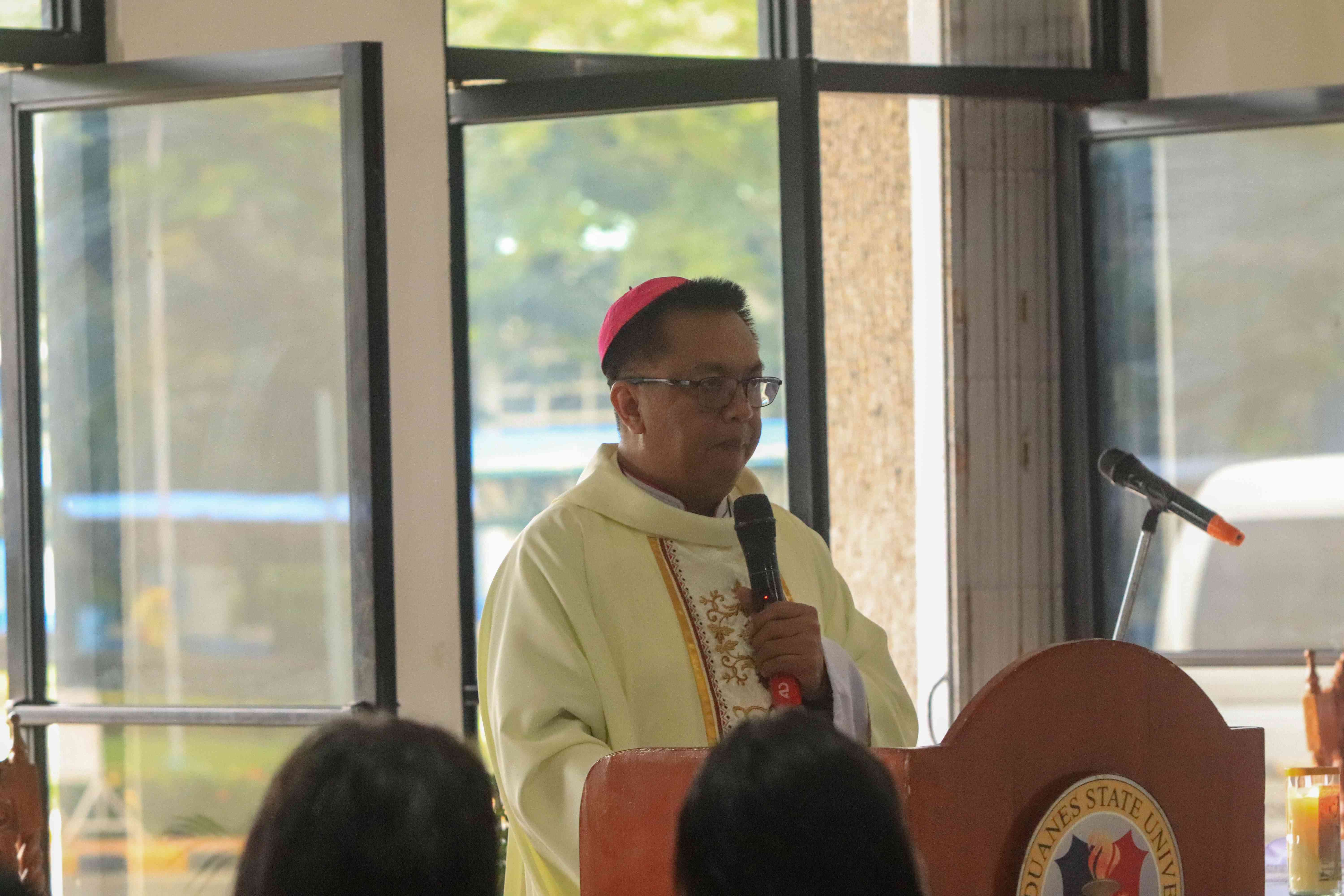
Presiding over The Eucharist on July 21, 2025, His Excellency Most Rev. Luisito A. Occiano, DD, Bishop of Virac, gave a homily that reframed the ancient journey of Moses and the Israelites as a roadmap for modern leadership—especially for someone tasked with running a university. The Mass, offered in thanksgiving by newly sworn-in CatSU President Dr. Gemma G. Acedo, was part of her first official week at the Office of the SUC President III. The bishop’s message gently pivoted from Scripture to present-day CatSU: “Like Moses, a university president must walk with people—sometimes hesitant, often weary—toward a promised future,” he said. "There will be Red Seas.” With a warmth that peeled back the usual weight of homilies, Bishop Occiano mused about the modern ‘red seas’ that might block progress—tight budgets or strained relationships. The bishop emphasized that leadership is an act of trust—trust not only in one’s own abilities, but also in the people one walks with, and in the unseen grace that carries a leader forward, especially when the path remains uncertain and the challenges don't ease right away. For Dr. Acedo, the Mass served as a meaningful and grounding moment as she begins the journey of guiding CatSU toward its next chapter. The bishop left the community with a reminder that challenges—like the Red Sea—are not dead ends, but pathways. With faith and courage, every crossing becomes possible.
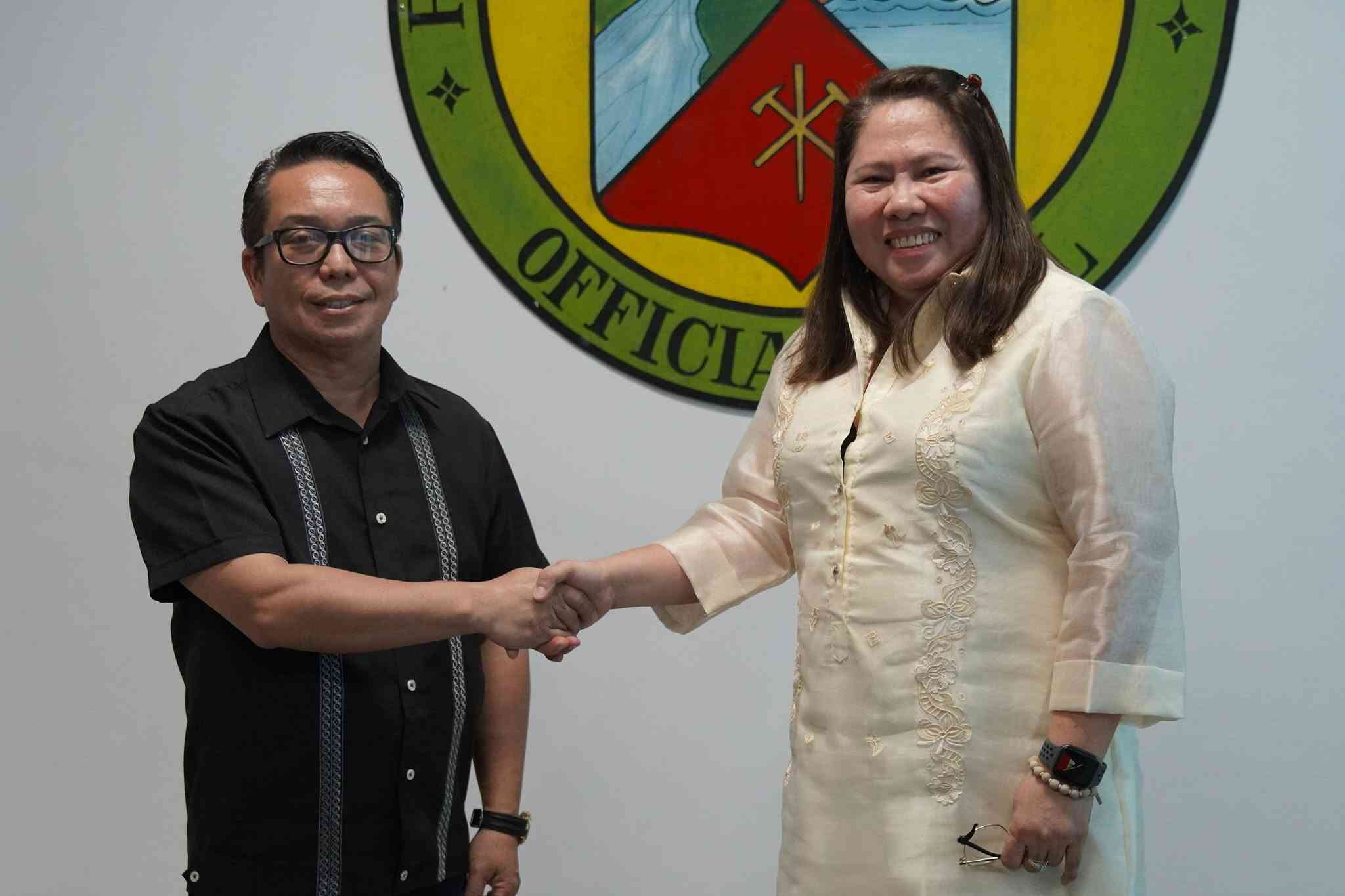
Catanduanes State University President Dr. Gemma G. Acedo paid a courtesy visit to Governor Patrick Alain T. Azanza today at the Provincial Capitol, reinforcing the growing partnership between the academe and the local government. Both champions of research, innovation, and academic globalization, Dr. Acedo and Governor Azanza expressed mutual commitment to deepening institutional collaboration in pursuit of sustainable development for Catanduanes. Their discussion centered on joint initiatives that will leverage education and governance to improve the quality of life for the island’s communities. The visit marks a renewed synergy between CatSU and the Provincial Government, as both leaders vowed to work hand-in-hand in translating academic knowledge into meaningful local impact.

The Department of Budget and Management (DBM) has issued National Budget Circular (NBC) No. 598, dated July 15, 2025, outlining the “Revised Organization and Staffing Standards (OSS) for SUCs – Phase II.” This new directive provides the general policies and implementation guidelines for the second phase of the revised OSS, specifically covering two critical areas in State Universities and Colleges (SUCs)—the Office of Research and External Linkages and the Auxiliary Services. NBC No. 598 builds on the previous phase of OSS reform, aiming to rationalize, professionalize, and strengthen institutional staffing structures aligned with evolving mandates of SUCs in research, innovation, and external partnerships, as well as support services critical to student welfare and campus operations. The circular provides the detailed staffing patterns and position standards that SUCs may adopt, subject to evaluation and approval by DBM, and is seen as part of broader efforts to enhance operational efficiency, functional relevance, and human resource development within the higher education sector. DBM emphasized that the implementation of the revised OSS must observe fiscal discipline, adhere to the principles of merit and fitness, and remain consistent with national development priorities.
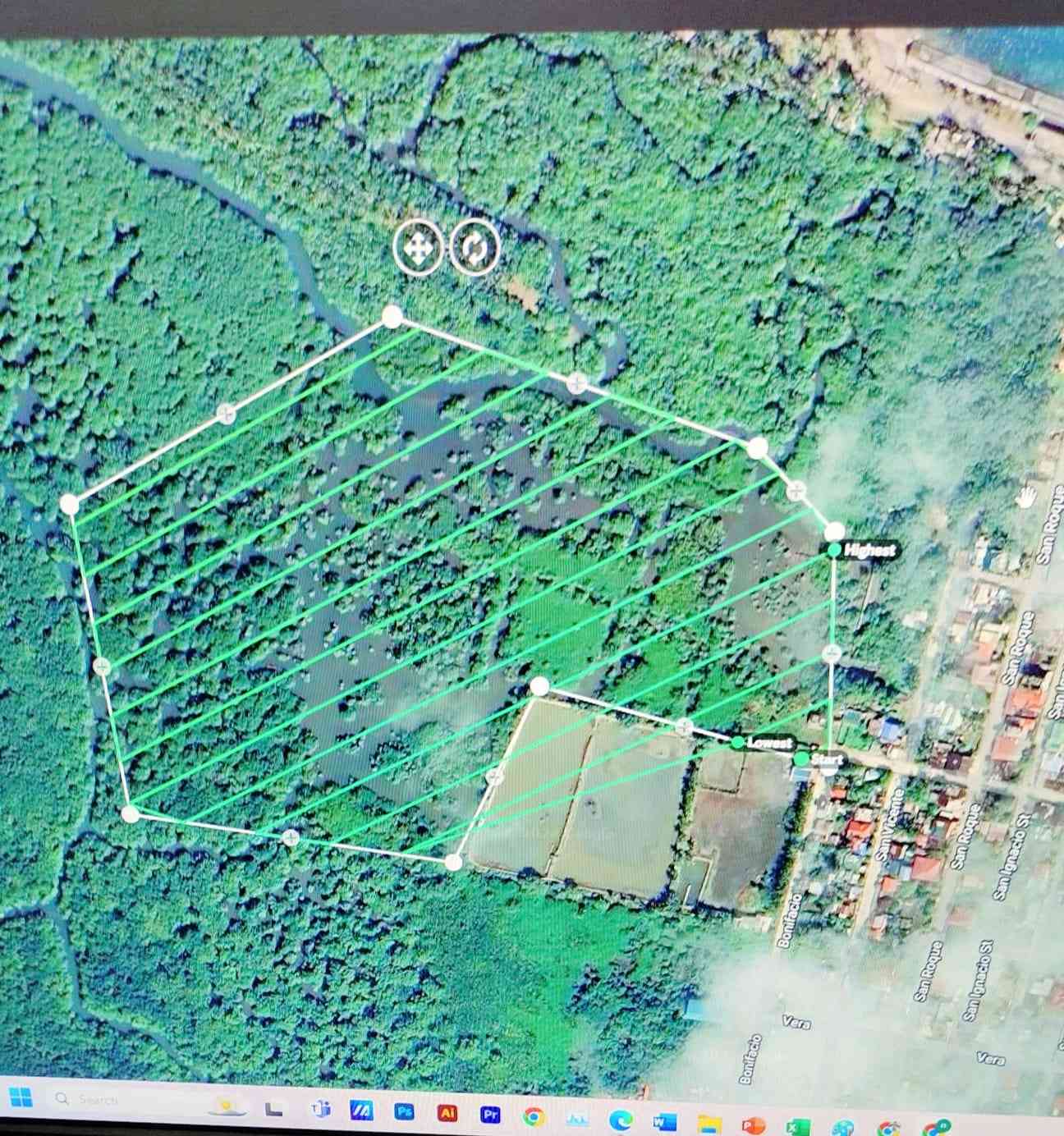
With former councilor Michael Tidon as the Lead Proponent, the Municipality of Pandan clinched a major climate win—₱86.1 million from the People’s Survival Fund (PSF)—greenlit during the 23rd PSF Board Meeting chaired by the Department of Finance on July 18. The project, endorsed by the Climate Change Commission, was backed technically and scientifically by the ACE-HEMS Program of Catanduanes State University, led by Professor VI Dr. Jimmy T. Masagca. Tidon, lead proponent for the LGU, said the proposal addresses both storm surge and drought risks—challenges long faced by Pandan’s coastal and upland farmers. The PSF grant covers the twin-pillar initiative: mangrove rehabilitation in six barangays and climate-smart farm infrastructure that includes solar irrigation, gravity-fed water systems, and greenhouses. A mangrove nursery in Brgy. Balagñonan and a new agri-learning center are also in the pipeline. Over 1,200 local residents stand to benefit, including fisherfolk and farmers linked to 30 people’s organizations across the municipality. In a related development, Baras town also moves forward with its own ₱7-M PSF proposal, now up for field appraisal—another mangrove-driven climate solution in the works, also guided by CatSU’s climate science experts. Pandan's funding approval places Catanduanes in the national spotlight as a rising model in grassroots climate resilience, with the University, local government, and community groups working in stride.
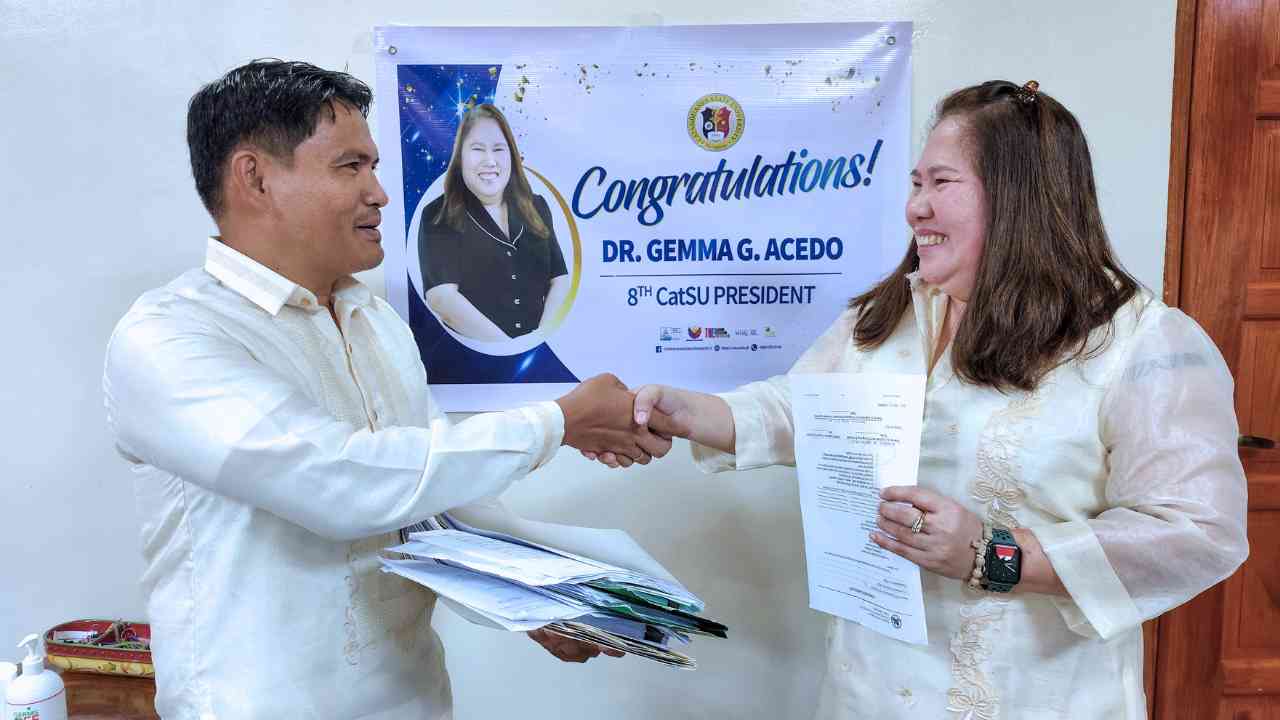
A quiet yet meaningful handover unfolded at Catanduanes State University as former OIC President Roberto B. Barba Jr. officially turned over documents and leadership reins to the newly elected and sworn-in 8th University President, Dr. Gemma G. Acedo. “It’s been 6 months and 10 days of deeply rewarding service,” said Barba, who led the university during its interim phase. “It is a great new day for CatSU. Congratulations to our new president. Let us all show our full support as the university steps into another milestone.” Elected and confirmed by the CatSU Board of Regents on June 17, Dr. Acedo, who previously served as Vice President for Academic Affairs, began her first morning with faith—a Thanksgiving Mass. “Gratitude is where everything begins,” she said. “This is not a personal achievement but a collective one.” In her first words as President, Acedo emphasized continuity and commitment: “I will uphold the core values of CatSU. I believe in a culture of research as a driver for institutional and societal growth. Our research should speak to the needs of the community.” She promised to listen, especially to the students. “Your voices will always be heard. Academic freedom and inclusivity are not mere principles—they are our way forward.” As CatSU continues to maintain its global ranking and push academic frontiers, Dr. Acedo assured the community that the university will remain rooted in inclusivity, integrity, and excellence.

The Commission on Higher Education (CHED) has officially released CMO No. 6, Series of 2025, establishing the detailed application process for higher education institutions (HEIs) seeking authority to offer Transnational Higher Education (TNHE) programs in partnership with foreign universities. The memorandum, issued pursuant to Republic Act No. 11448 or the Transnational Higher Education Act, aims to streamline the accreditation and regulatory process for local HEIs planning to offer dual degrees, franchised programs, or set up branch campuses in collaboration with Foreign Higher Education Institutions (FHEIs). CHED stated that the issuance of CMO No. 6 is part of its broader push to internationalize Philippine higher education by encouraging cross-border academic cooperation while maintaining rigorous quality standards. “This policy ensures that HEIs entering into international academic collaborations follow a transparent, merit-based, and quality-assured process,” the Commission noted in its official statement. Under the new guidelines, HEIs must submit a comprehensive application package, including proof of legal capacity, detailed program proposals, agreements with foreign partners, and internal mechanisms for quality assurance and academic integrity. The applications will undergo evaluation by CHED’s technical panels before final approval by the Commission en banc. CHED emphasized that only institutions granted official authority under this CMO may legally operate TNHE programs in the Philippines. The Commission also reminded all HEIs to avoid unauthorized arrangements, citing past enforcement actions involving institutions operating without proper approval. The release of CMO No. 6 comes amid a growing number of Philippine universities exploring academic partnerships abroad, as part of efforts to boost global competitiveness and expand student access to international credentials. The Commission said the policy is designed to align with global standards while protecting Filipino students from substandard or illegitimate educational offerings. CHED encouraged HEIs to carefully review the full guidelines and consult their respective CHED Regional Offices for technical assistance.
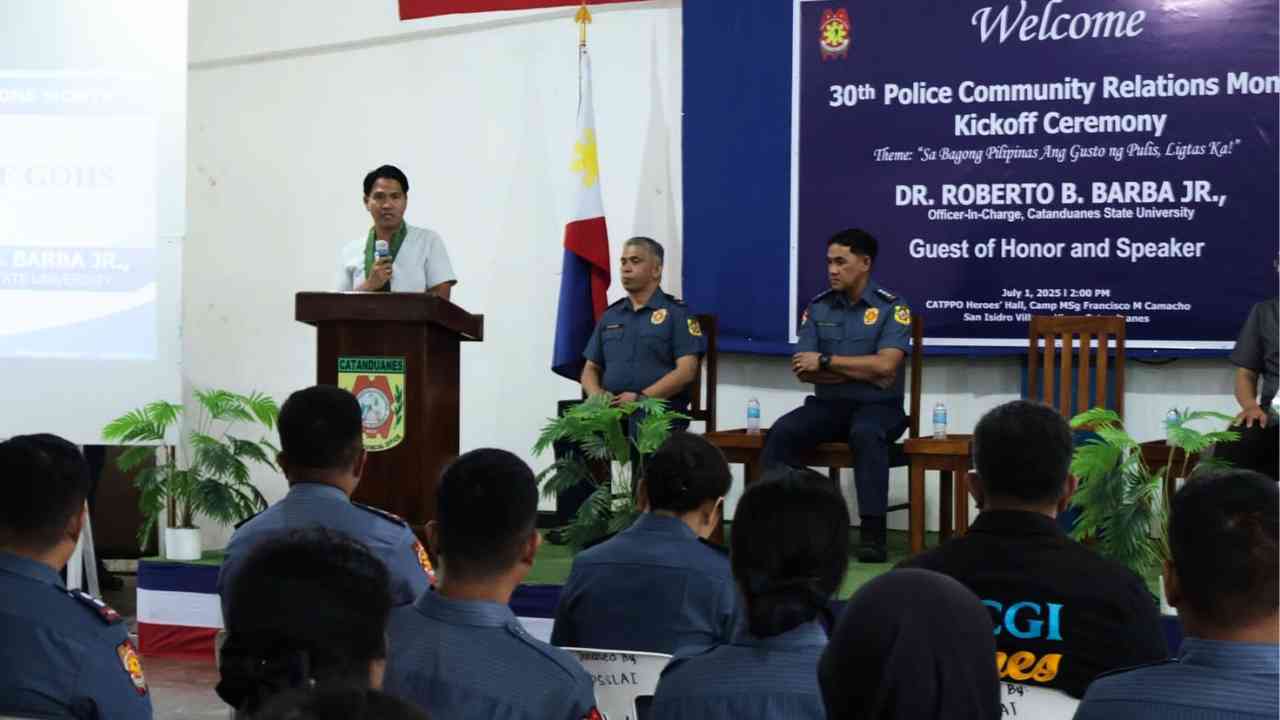
“Let’s talk about trust.” That was the pointed opening of Catanduanes State University OIC President Dr. Roberto B. Barba Jr., who served as Guest of Honor and Speaker during the 30th Police Community Relations (PCR) Month Kickoff Ceremony held July 1 at Camp Francisco Camacho in Virac. Speaking before members of the Catanduanes Police Provincial Office, community leaders, and guests, Dr. Barba wasted no time cutting to the core of this year’s theme—“Sa Bagong Pilipinas, Ang Gusto ng Pulis, Ligtas Ka!”—by framing safety not just as a police duty, but as a shared civic pact. “It’s not just about patrol cars or arrest reports,” he said. “It’s about what happens when law enforcement and the public meet—not in confrontation, but in cooperation.” Context is the Catalyst Barba underscored the uniqueness of island life in Catanduanes, where communities are tightly knit, and both good deeds and missteps are amplified. “In a place like this,” he said, “safety means more than low crime numbers. It’s seeing your kid ride a bike down the barangay road without you panicking. It’s the cop who fixes the sound system during the barangay fiesta.” Citing Data, Pushing Dialogue Backed by recent statistics, Barba noted that crime in Catanduanes declined slightly in 2024—from 381 to 372 reported cases. Rape dropped by 32%, and robbery by 52%. While theft and motorcycle carnapping saw a minor uptick, the quick response of local police and barangay units kept them in check. “These aren’t just numbers,” he emphasized. “They’re stories of families not broken, lives not lost—and communities choosing vigilance over violence.” But Barba said the real challenge lies in restoring public trust, which, unlike crime stats, can’t be easily measured. “You might not remember the crime rate, but you’ll remember how the police treated your cousin. Or whether they walked a student home after dark.” From Enforcement to Engagement He reminded the audience that building a “Bagong Pilipinas” isn’t just about reforming institutions—it’s about reimagining relationships. “Policing is a thankless job. When it’s done right, no one notices. When there’s one mistake, no one forgets,” he said. “That’s why community relations matter. Because safety isn’t just enforced—it’s co-created.” Barba called on all sectors to play a role—from educators teaching civic responsibility, to parents modeling respect for the law, to vendors and drivers who often notice things first. “You are the first line of intelligence,” he told the crowd. Calling Out Reality, Not Just Rhetoric Acknowledging ongoing concerns about abuse, rogue elements, and public hesitation, Barba called for “real-time accountability, not just real-time policing.” “Let’s not solve these issues by standing on opposite ends, shouting,” he said. “Let’s sit down—over coffee, during feeding programs, town halls—and ask: ‘Ano bang tunay na nangyayari? Paano tayo tutulong?’” Higher Education’s Role As head of the island’s lone state university, Barba took pride in CatSU’s graduates—many of whom now serve in the PNP and justice sector—even though the university doesn’t offer Criminology. “We produce graduates who don’t just know the law—but who live it, with compassion, intelligence, and integrity.” He also pledged continued university support for initiatives that bridge campuses with community peace-building efforts. A Closing Challenge Ending his message with a challenge to both police and public, Barba asked: “Can we build peace not just through presence, but through partnership?” And with that, he redefined the day’s celebration—not just as a ceremonial kickoff, but as a shared commitment to safety, trust, and the work of building a country where both the public and the police want the same thing: a safe, dignified life for every Filipino.
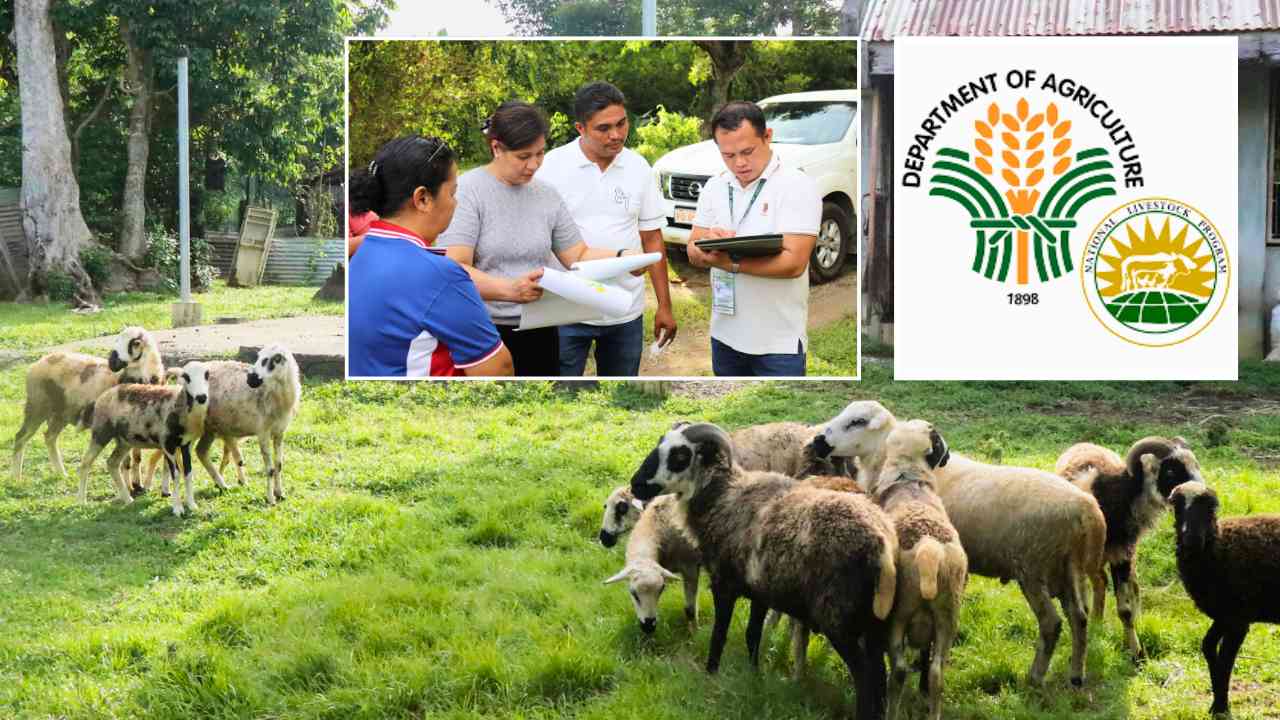
The Department of Agriculture – Regional Field Office 5 (DA-RFO 5), through its validation team led by Regional Livestock and Poultry Program Coordinator Marianito A. Tesorero, conducted a site validation on June 18, 2025, at Catanduanes State University (CatSU) Main Campus for the proposed Livestock Economic Enterprise Development (LEED) Project. The team was formally welcomed by CatSU Officer-in-Charge Dr. Roberto B. Barba. The delegation included Maria Gracia E. Postigo, Farm Supervisor and APCO-Albay Technical Staff; Herbal De Leon, Farm Supervisor; and staff from the Regional Agricultural Engineering Division. After the inspection, Mr. Tesorero issued a summary of recommendations endorsing CatSU for the LEED Project, which covers livestock initiatives such as goat, honeybee, and layer chicken production, along with support for essential equipment including feed mills, incubators, and pelletizers. The endorsement was confirmed and signed by CatSU Farm Manager Eddie S. Millon, with support from Dr. John Joseph M. Camu, University Veterinarian; Aileen S. Llandelar, Project Coordinator; Planning Officer III Ar. Mae Lizza D. Bublo; and other university personnel who assisted during the visit. The team conducted a comprehensive inspection of the university’s livestock and poultry facilities. Another validation is scheduled at CatSU Panganiban Campus on June 19 to assess the proposed site for the swine production package under the LEED program.

Despite heavy rains, Catanduanes State University (CatSU) successfully underwent evaluation on June 11, 2025, by the Department of Agriculture–Agricultural Training Institute (DA-ATI) Region V as it vies to become the second state university in the Bicol Region and the seventh Learning Site for Agriculture (LSA) in the province. The DA-ATI LSA validation team, composed of Training Specialist I and LSA focal person Alexander O. Vargas, Planning Officer II Nida H. Garcia, and technical staff, conducted the assessment to verify the university's compliance with LSA standards and guidelines. CatSU Officer-in-Charge Dr. Roberto B. Barba, Jr. and designated Farm Manager Eddie Millon welcomed the evaluators and highlighted the university’s readiness, citing its extensive agricultural land, diverse crops and livestock, advanced machinery, and expanding training facilities. The team inspected key areas including the College of Agriculture and Fisheries building with its poultry section, the Extension Building with its training hall, the solar farm, and CatSU’s main farm featuring crops like bitter gourd, eggplant, and pineapple. The DA-ATI team provided feedback and will endorse CatSU’s application to the ATI Central Office. Upon approval, CatSU will be formally certified and a Memorandum of Agreement ceremony will be held. LSAs are part of ATI’s initiative to promote practical, hands-on agricultural education by partnering with institutions and successful farms to demonstrate replicable farming technologies and practices.
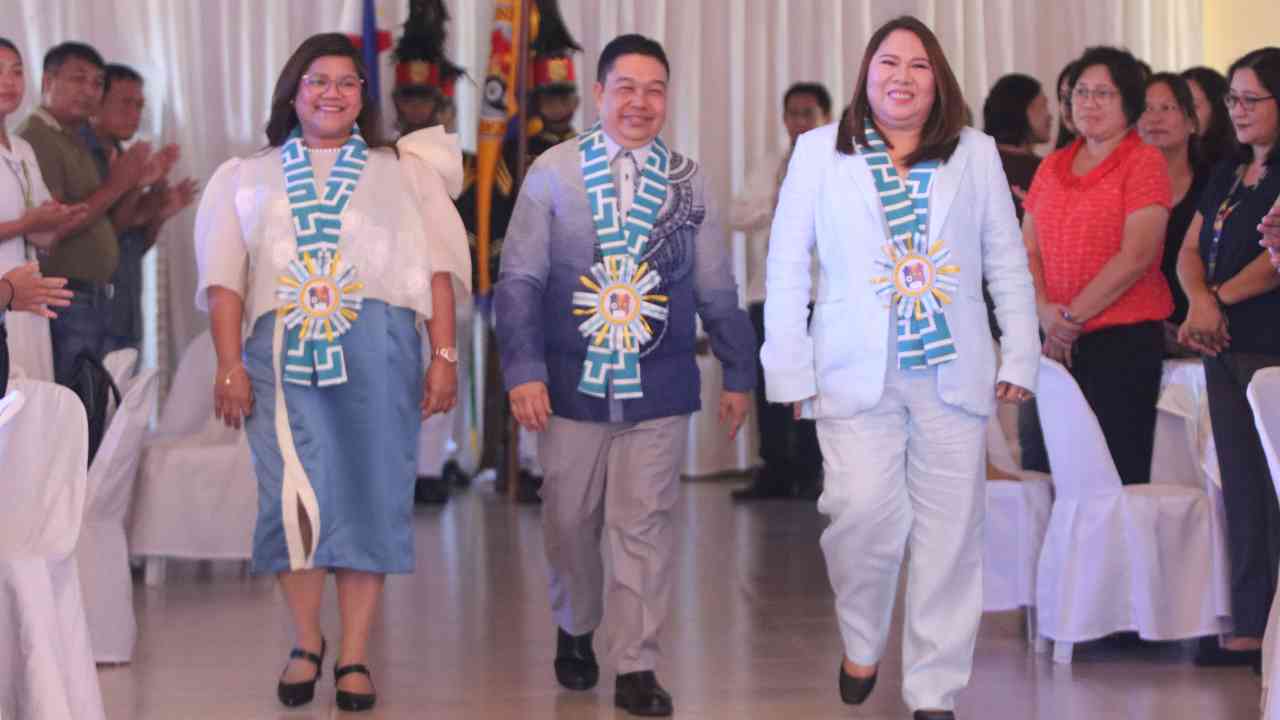
The race for the highest seat at Catanduanes State University just got real. Three contenders—each with credentials and a case to make—stood before the public today, May 14, in a high-stakes forum that could shape the university’s next years. Held at the University Auditorium and witnessed by hundreds on-site and thousands more via livestream on CatSU’s official Facebook page, the public forum gave the community a front-row seat to leadership in the making. Before the pitch came the premise—and it hit hard. “This isn’t just another forum,” said CatSU Officer-in-Charge Dr. Roberto B. Barba Jr. “This is a compass moment. A pause. A pulse check. A choice.” Speaking with the weight of legacy behind him, Barba framed the day as more than academic. He threw it back—VNATS in 1961, CSC in 1971, and finally, the birth of CatSU in 2012—milestones built, he said, on grit, patience, and “quiet labor.” “CatSU isn’t just a name on a gate. It’s a book, rewritten by time and people,” he said, nodding to faculty who taught through brownouts and staff who stayed late while no one watched. “They’re not just figures in history—they're the reason we’re here.” And now, the university stands on another threshold. Barba didn’t sugarcoat it: The presidency isn’t a prize. It’s a burden—best carried with humility, heart, and a whole lot of listening. “To whoever is entrusted,” he said, “this isn’t a crown. It’s a calling.” The three candidates vying for the post are Dr. Gemma G. Acedo, Vice President for Academic Affairs; Dr. Maria Edna R. Inigo, former Vice President for Administrative and Financial Affairs; and Dr. Alex H. Navarroza, former President of Bicol State College of Applied Sciences and Technology (BISCAST). The Search Committee for President (SCP) is composed of respected academic and civic figures: Chairperson Dr. Tirso A. Ronquillo and members Prof. Maria Concepcion V. Marquez, Rev. Fr. Paul I. Isorena, Dr. Faye Lea Patria M. Lauraya, and Dr. Raul F. Muyong. This afternoon, the process deepens as the three candidates face the committee behind closed doors for the panel interview, a critical step in deciding who will take the helm. So now, CatSU watches—and waits. Three contenders. One chair. The future? Still unwritten.
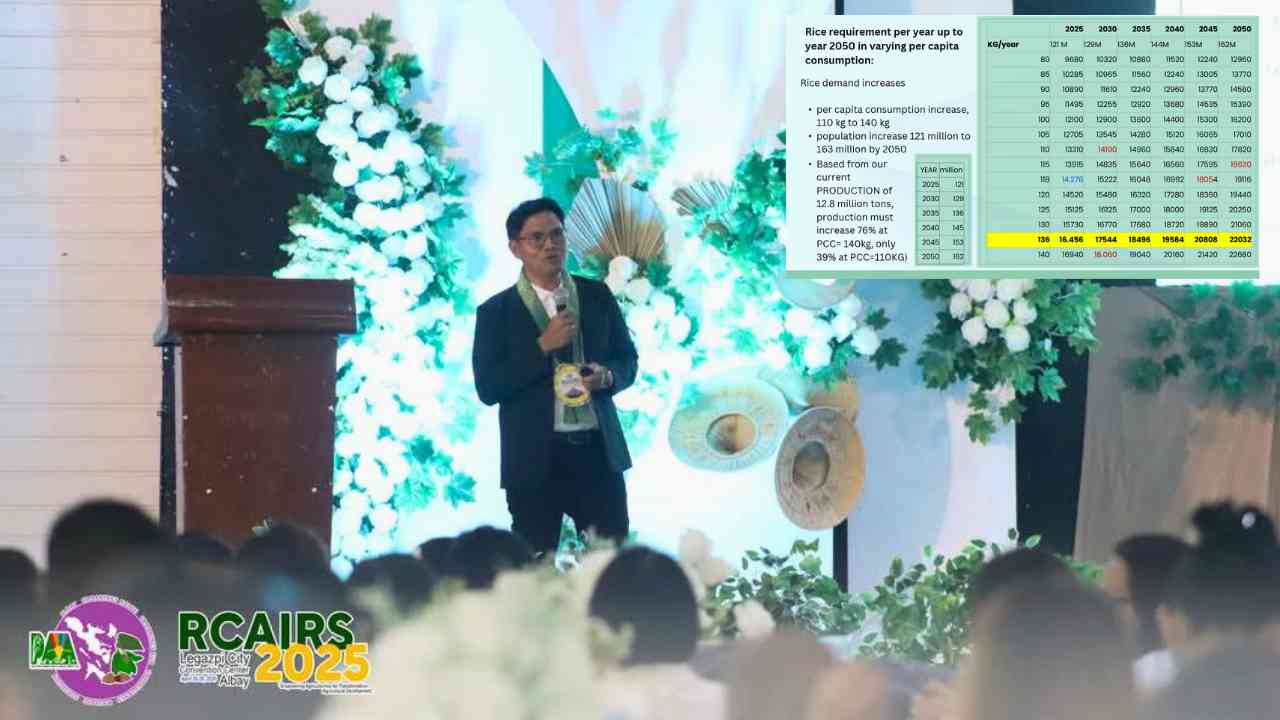
Dr. Roberto B. Barba Jr., Officer-in-Charge of Catanduanes State University (CatSU), joined top minds in agriculture as a resource speaker at the Regional Conference on Agricultural Innovation, Resiliency, and Sustainability (RCAIRS) held from April 28 to 30 at the Legazpi City Convention Center. Barba, an expert in crop science, spoke on the topic “Crop Productivity at Work: Yield Strategies, Food Sufficiency, and the P20 Challenge,” tackling real-world solutions to improve crop outputs and meet food targets amid tight budgets. The RCAIRS was organized by the Philippine Association of Agriculturists (PAA) – Canarium ovatum-Bicol Chapter, in partnership with DA-RFU5, ATI-RTC 5, and BCAARRD. This year’s theme, “Empowering Agriculturists for a Transformative Agricultural Development,” aimed to equip professionals and stakeholders with cutting-edge agri-tech insights and tools. Despite a packed schedule, Barba headed straight from Camiguin after attending the National SCUAA, where he supported the CatSU athletes and the rest of the Bicol delegation.
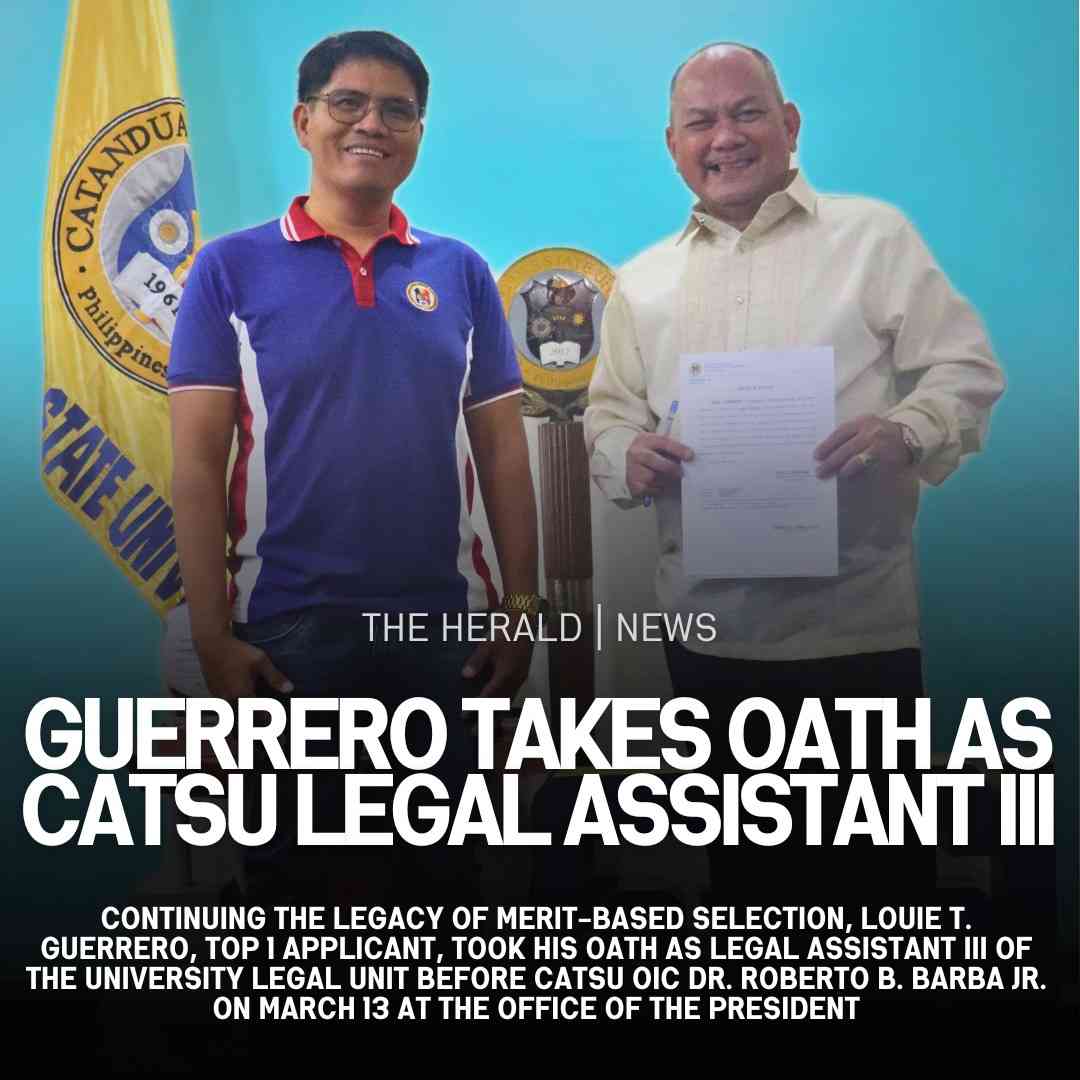
Continuing the legacy of merit-based selection, Louie T. Guerrero, top 1 applicant, took his oath as Legal Assistant III of the University Legal Unit before CatSU OIC Dr. Roberto B. Barba Jr. on March 13 at the Office of the President. Guerrero, who previously served as Executive Assistant III under the Executive Assistance Services, secured the post through a stringent selection process by the Personnel Selection Board chaired by Vice President Benjamin Hannycel T. Nuyda. Meritocracy stood as one of the hallmarks of then-President Dr. Patrick Alain T. Azanza’s administration, ensuring top-caliber hires for the university.

Catanduanes State University (CatSU) sustained high customer satisfaction ratings for 2023 and the first half of 2024, according to a Management Review held on November 29 by the Office of the Vice President for Administrative and Financial Affairs and the Quality Assurance Unit.Frontline services at CatSU Main recorded an impressive 99.48% satisfaction rate for the January to June 2024 period, surpassing the same months in previous years. Non-frontline services also posted a slight improvement, achieving a 98.25% satisfaction rate compared to 98.13% in the preceding term.CatSU Panganiban maintained a stellar 99.42% satisfaction rate for its frontline services, though slightly lower than its previous midterm score of 99.60%.Vice President for Administrative and Financial Affairs, Engr. Benjamin Hannycel T. Nuyda, urged all offices to establish clear quality objectives and work instructions to consistently meet client expectations.“Ensure that each office has clearly defined quality objectives,” the VP emphasized on the importance of client-focused service delivery. Meanwhile, QA Unit Administrative Officer V Josephine D. Rojas tackled internal and external issues requiring resolution and pinned on the need to update the university's work structure, with the support of the Board of Regents (BOR) to strengthen institutional efficiency.
![[MAGANDANG BALITA] 1 Bilyon Smart Campus Project sa CatSU](newsportal/admin/postimages/
f4ed0d0eed6007a473b65bd429e814f01725271834.jpg)
Personal na pumunta sa Appropriations Committee ng kongreso si Dr. Patrick Alain T. Azanza nitong Agosto 26, 2024 upang mapondohan ang panukalang isang bilyong pisong Smart Campus project sa Catanduanes State University.Nakausap ni Dr. Azanza si Cong. Elizalde Co, Chairman ng komite, na nagbigay ng positibong tugon at tiniyak ang suporta para sa proyekto ng CatSU.“I am very happy that no less than Appropriations Chairman ‘Zaldy’ Co assured me that he will support my proposed Smart Campus Project, and it will be on top of the regular budget of CatSU,” saad ni Dr. Azanza sa kaniyang Facebook post.Dagdag pa ng Pangulo na madali aniya silang nagkaintindihan ng technical staff ng appropriations committee ukol sa proyekto dahil sa kaniyang natapos na post-doctoral program sa Massachusetts Institute of Technology- Institute of Data, Systems, and Society (MIT-IDSS) na Data Science and Machine Learning. “Naalala ko ganito din ang ginawa nating effort dati para sa PhP300 million coliseum (MICES Building) project na ngayon ay under implementation sa loob ng CatSU Campus,” pagtatapos ng CatSU president. Sa huli, nagpaabot ng pasasalamat si Dr. Azanza kina Ako Bicol Party-list representatives Cong. Elizaldy Co at Cong. Alfredo ‘Pido’ A. Garbin Jr dahil sa patuloy na suporta nila sa CatSU. #PadagosNaPatanos
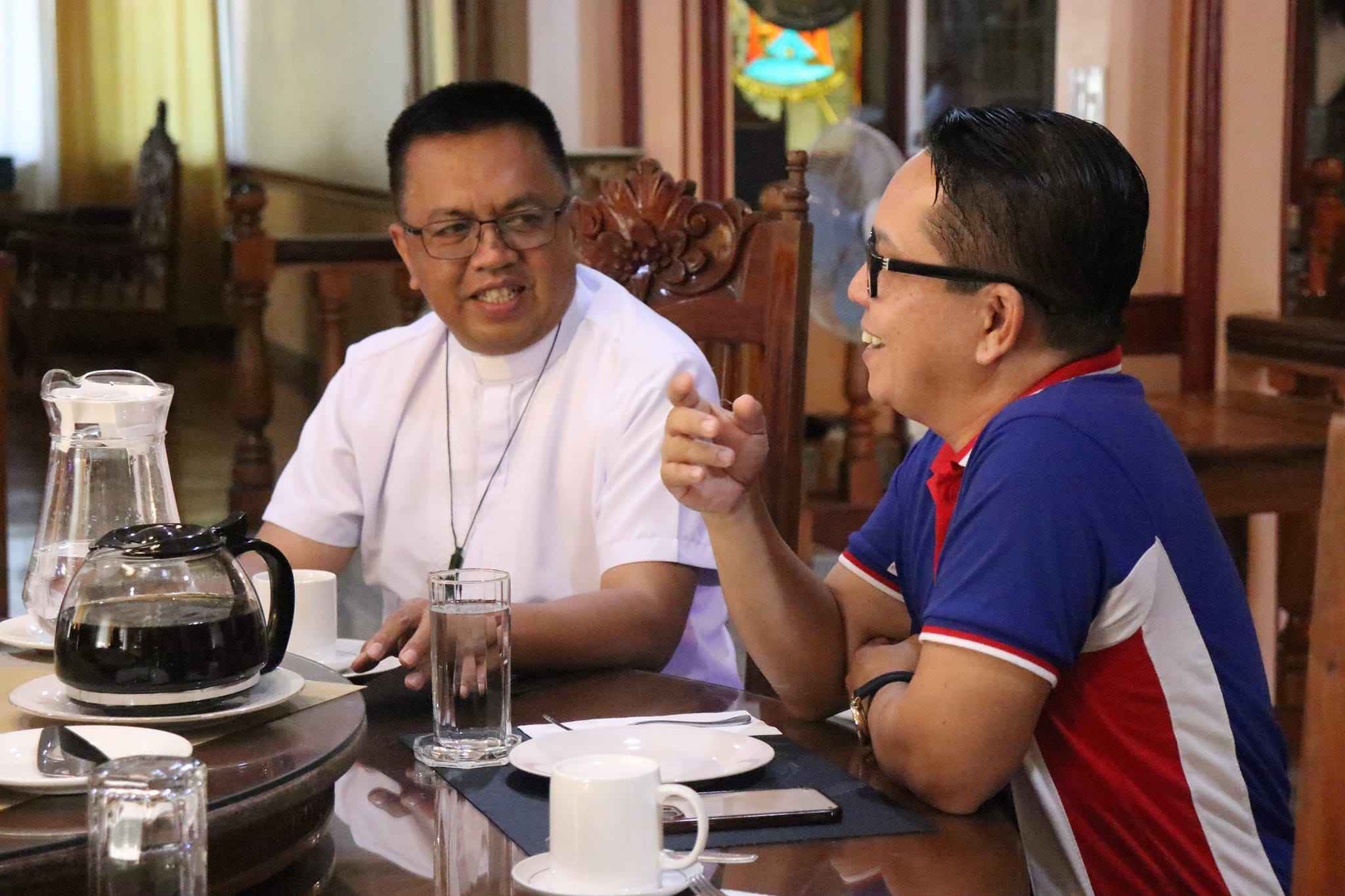
Staunch advocates for ecological protection and youth spiritual development, both leaders shared a light-hearted yet meaningful moment discussing their shared ecological advocacies and youth apostolate. Resonating with the recent pronouncement of the Catholic Bishops’ Conference of the Philippines (CBCP) in Cagayan De Oro, the first meeting Bishop Luisito attended, he shared how the CBCP has decided to upgrade their diocesan ecology desks to a full ministry focused on 'integral ecology,' making the care for creation a priority pastoral concern.For CatSU, which has taken a firm stand against mining in the province and has been active in "green" initiatives, this connection represents a partnership in advocacy. Moreover, the university's Roman Catholic Campus Ministry, under the advisership of Professor Emlyn M. Lanon, plays a crucial role. This ministry, one of the main programs for evangelization of the Commission on Youth Apostolate (CYA) of the Diocese of Virac, focuses on improving the spiritual, mental, and social well-being of all students, faculty, and staff at CatSU—a mission Bishop Luisito is eager to know more about and strengthen further.
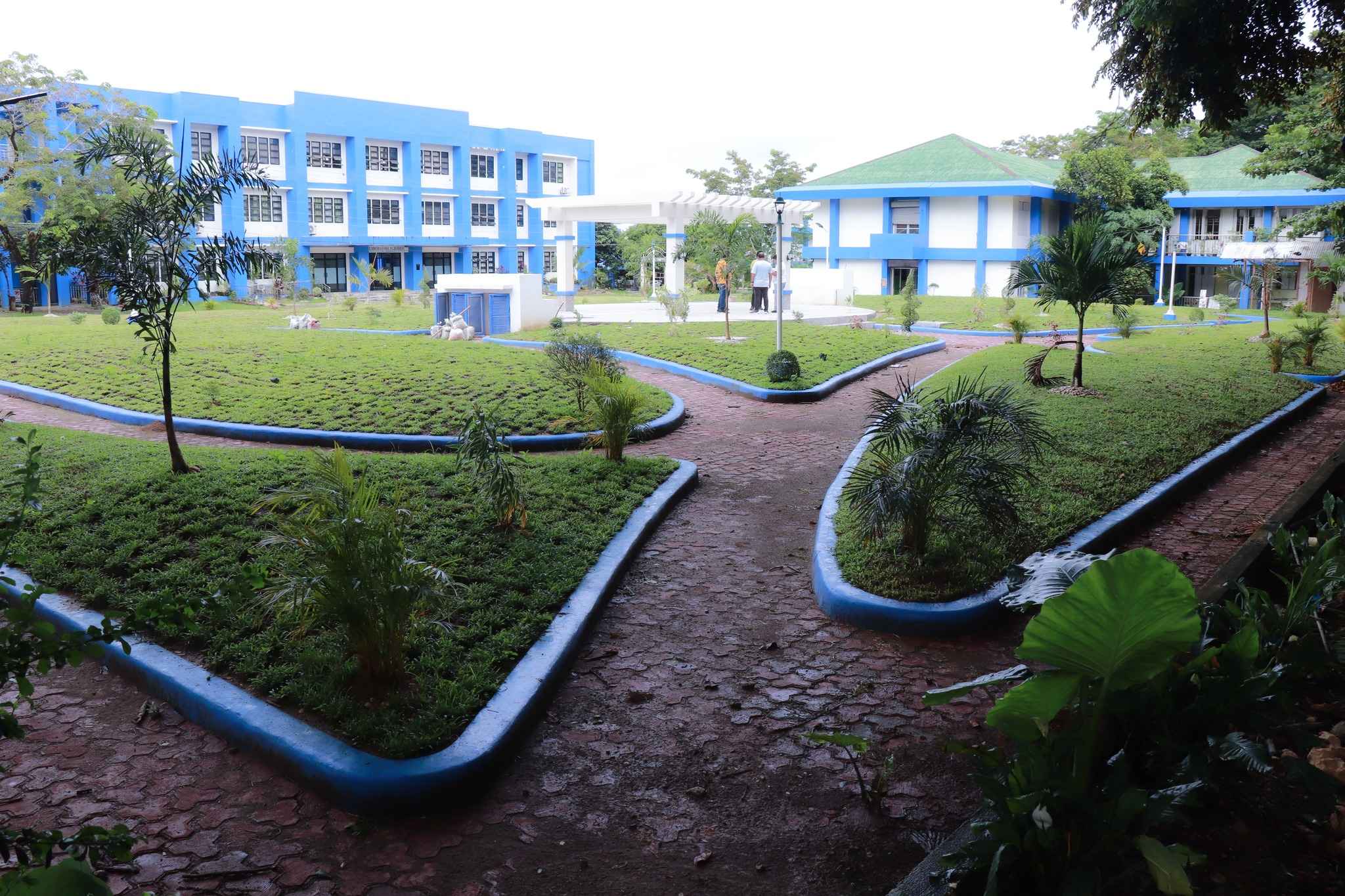
Eyeing its vision for a greener future, Catanduanes State University (CatSU) will soon launch its first-ever Water Catchment Facility, an innovative project that not only symbolizes environmental stewardship with more sustainable and efficient campus environment but also promises significant cost savings for the university. 𝑨 𝒔𝒕𝒂𝒕𝒆-𝒐𝒇-𝒕𝒉𝒆-𝒂𝒓𝒕 𝒘𝒂𝒕𝒆𝒓 𝒄𝒂𝒕𝒄𝒉𝒎𝒆𝒏𝒕 𝒔𝒚𝒔𝒕𝒆𝒎The Water Catchment Facility incorporates a state-of-the-art basin with a capacity of 350 cubic meters, designed to collect rainwater from the 17 university buildings. This harvested water is redirected for non-potable uses, such as toilet flushing and cleaning. CatSU President Dr. Patrick Alain T. Azanza, who pioneered this innovation said the implementation of this water catchment system is expected to significantly reduce the university's monthly water bill by up to 50%. Thus, it is expected to save the university around Php 43,000 monthly, reducing the average water bill from Php 86,000 during regular classes.Equipped with a solar pump and an automatic booster, the system ensures reliable water distribution throughout the campus, even reaching higher floors of university buildings. Enhancing the overall functionality of the campus infrastructure, this Php 14.4 M facility is part of the University’s Land Use Development Plan, which was created by the present administration and approved by the Board of Regents after being reviewed by representatives from CHED, DPWH, DAR, DENR, and other government agencies.The old covered court, which was severely damaged during Typhoon Rolly, has been demolished with the necessary permit from the Office of the Building Official of Virac, to make way for this innovative structure. The scrap materials were preserved by the Building and Grounds Services (BGS) and were used in constructing a covered basketball court inside the University Sports Complex.𝑻𝒉𝒆 𝒁𝒆𝒏 𝒈𝒂𝒓𝒅𝒆𝒏Integrating beauty with functionality, the Water Catchment Facility is also home to CatSU's first-ever “Zen Garden.” This space not only serves as a green area but also provides a relaxing environment for students and staff. The president stated that this garden aims to be more than just a visual delight; it will serve as a venue for poetry recitals and other creative arts events, noting that students can access the university's 1.5 GBPS internet connection with Starlink backup there."We place high value on the creative arts, and its related events can be hosted in the garden as an alternative venue similar to practices in prominent universities like UP, as well as other universities in Europe and the US," he said.Aside from its aesthetical appeal, this initiative complies with the open green space requirements for universities in the Philippines. Looking ahead for future plans and sustainability, the university plans potential projects that could arise from the savings generated by the Water Catchment Facility, such as establishing water purification stations on campus to provide free drinking water for students and staff. 𝑨 𝒃𝒆𝒂𝒄𝒐𝒏 𝒐𝒇 𝒉𝒐𝒑𝒆 𝒇𝒐𝒓 𝒕𝒉𝒆 𝒄𝒐𝒎𝒎𝒖𝒏𝒊𝒕𝒚For CatSU administration, its passion to sustainability is not just an internal initiative; it is rooted with the broader community of Catanduanes. “My leadership style is to inspire people to complete our projects at CatSU because, in the end, it benefits not just us but the entire island,” the president said, expounding on the administration’s community-centric approach which aligns with the university's mission for environmental awareness and responsibility among its stakeholders. “All of this requires hard work. It is not about personal gain or honor, but for all Catandunganons,” said Dr. Azanza, underscoring the collective efforts under his leadership, with breakthroughs happening in the university, reflecting CatSU’s mission to serve its stakeholders and the people of Catanduanes.




